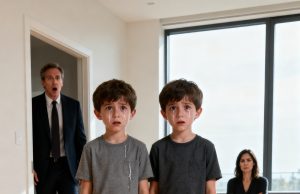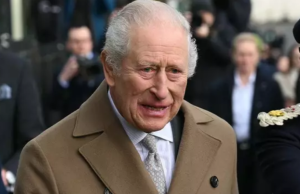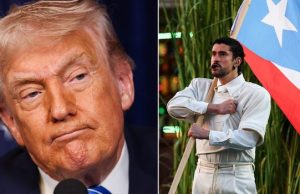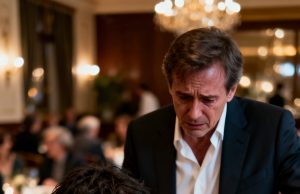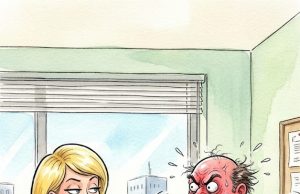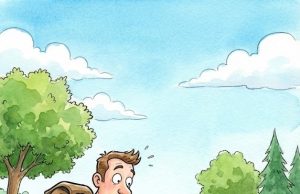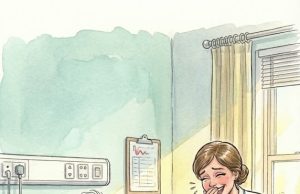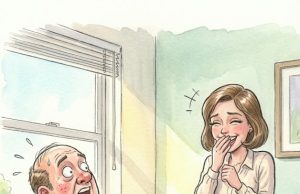
The wind screamed like a wild animal in pain, sweeping thick snow across the lonely countryside road.
Amelia Reynolds gripped the steering wheel tightly, eyes straining through the foggy windshield. Her sleek, high-end sedan jerked and slipped slightly on the frozen asphalt before sputtering to a halt. The dashboard lights blinked once, then faded into darkness. The engine gave up.
“No, no, not now,” Amelia muttered through clenched teeth, smacking the steering wheel. She reached for her phone—no service. The storm outside was growing fiercer by the minute.
She cracked the car door open and was immediately hit by an icy blast that nearly knocked the breath out of her lungs.

Wrapping her coat tighter around her body, she stepped out into the snowstorm. Her polished black boots sank deep into the snow with each step.
She had been on her way to a high-profile fundraising event, hours away from the city. Her GPS had suggested a shortcut through this remote backroad, and now she was stranded in the middle of nowhere.
Then, in the distance, she noticed a faint light flickering beyond the snow-covered fields.
A house? A barn? She couldn’t be sure—but it was her only hope.
Fighting through the wind and snow, soaked and shivering, Amelia trudged toward the light. By the time she reached the wooden porch of a weathered farmhouse, her fingers were nearly frozen, her lips numb. She knocked hard, hoping someone would answer.
The door creaked open to reveal a man, tall, solidly built, dressed in a flannel shirt and worn jeans.
His face was rugged, carved by years of work outdoors, his eyes calm but unreadable. He didn’t smile.
“Evening,” she said, her voice trembling. “My car broke down. I have no signal. I… I need help.”
He stared at her in silence for a few moments. Then he nodded and stepped aside, allowing her to enter.

The warmth inside the house wrapped around her like a blanket, though it wasn’t the typical heating system she was used to. A terracotta stove glowed in the corner, with the smell of wood smoke and something hearty cooking on the stove.
“You can warm yourself by the fire,” he said, shutting the door behind her.
She sat down slowly, removing her gloves and coat, though the cold still lingered in her bones. The man returned to his task at the kitchen counter, cleaning a fish with methodical, practiced movements.
He didn’t glance at her, didn’t ask questions, didn’t seem to care who she was or why she was there.
“Thank you,” she said quietly. “I’m Amelia. Amelia Radu. I’m—”
“I know who you are,” he interrupted. “Saw you on television. You’re the hotel lady.”
Her eyebrows rose in surprise. She hadn’t expected recognition here.
“And you?”
“Mihai. Farmer, fisherman, carpenter—depends on the day.”
There was no irony in his tone. Just a fact. Something about his simplicity intrigued her.
“Is there a phone I can use? Maybe out here there’s still a signal…”

“No phone,” Mihai said plainly. “Took down the antenna a couple of years ago. Didn’t need it anymore.”
She stared at him in disbelief. “Then… how do you live?”
“Better than most,” he replied. “No debts, no deadlines. I sleep well. I chop wood in winter, plant crops in spring, and fish when I need food. That’s enough.”
Amelia had no response. Her world revolved around business meetings, gala dinners, and constant connection.
His words sounded foreign, almost laughable. But the calm in his voice made her wonder if maybe, somehow, he was right.
“I’m not used to asking for help,” she admitted after a moment.
“Nature doesn’t care about your bank account,” Mihai said. “In a storm like this, we’re all just human. No different.”
He passed her a mug. “Soup. It’ll warm you up.”
She accepted it with both hands, stunned by the quiet generosity.

No one had offered her anything without expecting something in return—not in a long time. She sipped the soup in silence.
That night passed slowly. Mihai gave her a thick wool blanket and the bed, choosing to sleep on the floor without complaint or comment. By morning, the wind had calmed and the snowfall had lessened. Mihai brought out a horse and an old wooden sled.
“I’ll take you to the village,” he said. “You’ll get phone service there. Someone can come for you.”
As they rode through the quiet landscape, she asked, “Why do you live like this? Alone, out here in the middle of nowhere?”
He looked at her, just briefly. “Because I lost everything once. And in doing so, I realized I’d gained freedom.”
She didn’t speak after that. In the village, he helped her off the sled, then turned and walked away without looking back.
Three months later, the upper crust of society buzzed with gossip. Amelia Radu had sold off the majority of her luxury empire. She left the corporate world behind, bought a small house in a remote village, and stopped attending conferences, galas, and charity events.

Whispers circled—some said she had gone mad, others suspected a breakdown. But Amelia knew better.
Sometimes, it takes a snowstorm and a broken-down car to lead you to the truth. To remind you what really matters.


